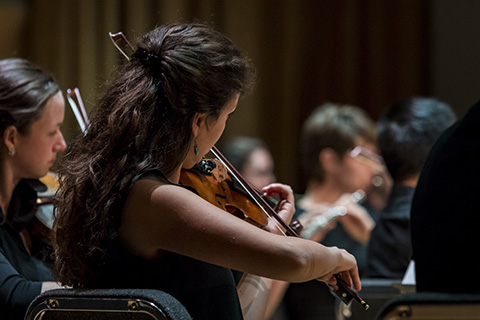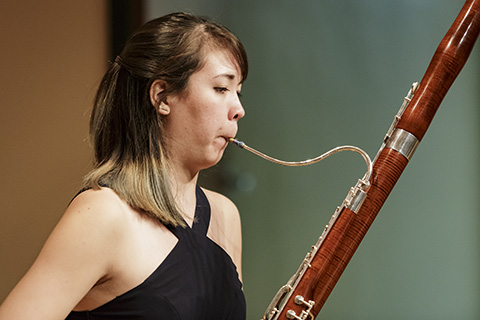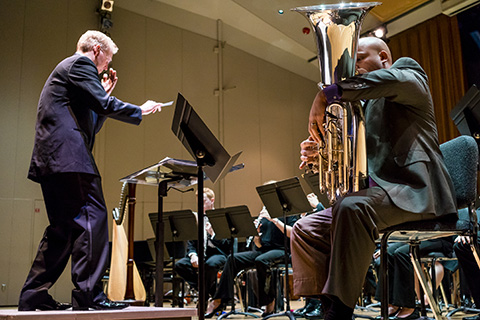The Frost School of Music offers three instrumental doctoral degrees in Instrumental Performance, Multiple Woodwinds, and Instrumental Conducting. We offer these programs at both a master’s and doctoral level, and many students who began at Frost during their bachelor’s or master’s degree have continued on to complete their doctoral degree with us as well. Providing multiple tiers of the same concentrations reinforces a culture of expertise and excellence in our departments and allows students to interact with and learn from a strong cohort of peers who have extensive experience in high-level study.
Why Studying Instrumentation on a Doctoral Level?
The study of the life of the mind is essential for society. Doctoral students in all fields—music or otherwise—share one thing in common: they are passionate about their work. A doctoral program provides students with the time, space, and financial support to pursue their interests. Whether you want to perform professionally, teach at the college or university, or become a professional researcher who publishes your findings, a doctoral program can connect you with the intellectual and musical support you need. At the end of an Master of Music degree, many students have found that they’re just not ready to depart from the nurturing mentorship of the academy and they need more time. Other students have realized that their passion is university teaching. Because the academic teaching job market is so competitive, obtaining a doctoral degree can truly give you an edge.
Doctor of Musical Arts in Instrumental Performance
The mission of the Doctor of Musical Arts Degree in Instrumental Performance is as follows:
- To provide students the highest quality of education available in the areas of instrumental performance and musicianship that will provide them the ability to pursue successful professional performance careers as classical instrumentalists.
- To stimulate the student's awareness and artistic creativity in the field of instrumental performance.
- To provide students public performance opportunities in a supportive and encouraging environment.
- To ensure that students have acquired the type of writing and research abilities required of a terminal degree from a leading research university, enabling them to pursue successful careers as teachers, performers, and researchers at the university level.
Possible classes include the following:
- Applied Lessons
- Analytical Techniques
- Teaching Music in College
Students also participate in six large ensembles and six small ensembles. All DMA students must complete a doctoral recital with an accompanying doctoral essay. The range and scope of these twin projects depends on the instrument(s) on which your study is focused. Begin talking with your faculty advisors about this component of the process early to make sure that you remain on track.
Doctor of Musical Arts in Multiple Woodwinds
A DMA in Multiple Woodwinds provides candidates with the opportunity to spend multiple years studying more than one instrument. Study in oboe, flute, saxophone, clarinet, and bassoon are available. Students take applied lessons and participate in six large ensembles and six small ensembles. DMA students have the opportunity to take the musicology elective of Analytical Techniques as well as a Performance Seminar: Teaching Music in College. DMA students have space to take other cognates and electives depending on their interest and expertise.
A doctoral recital will take place during your final year in the program. Working closely with a faculty advisor to select your music literature, you will spend significant time preparing for the recital as well as write a doctoral essay. The essay requires a proposal that must be approved by your department. More details about the doctoral essay can be found in the Academic Bulletin.
Doctor of Musical Arts in Instrumental Conducting
The mission of the Doctor of Musical Arts Degree in Instrumental Conducting is as follows:
- To provide students with the highest quality training possible to bridge academic training into entry-level careers as professional artists;
- To provide students with performance opportunities that develop and demonstrate the integration of musicianship and performance practice;
- To assist students with identifying opportunities and preparation for competitions, internships, apprenticeships and other professional venues for the classical artist;
- To ensure that students have acquired the type of writing and research abilities required of a terminal degree from a leading research university, enabling them to pursue successful careers as teachers, performers, and researchers at the university level.
Instrumental conducting students have the opportunity to participate in a range of exciting courses and electives. All doctoral students in the program take Applied Conducting Lessons with one of the department’s faculty mentors. Students also participate in six large ensembles. Wind conductors are required to take History and Literature of the Wind Band. Other electives may be approved upon request.
Students in the Instrumental Conducting program have the opportunity to take Teaching Music in College as well as Analytical Techniques, a musicology elective. The degree culminates in a DMA Essay Proposal (which must be approved by the department) as well as a DMA Recital. You’ll spend significant time preparing for these capstone components, so it’s important to have an idea from the beginning of your degree about what they will entail. It’s advised that you ask other students about their experiences as well as attend their recitals so that you have an idea of what to expect.
Is Funding Available?
Funding is available for DMA students in a few different ways. Graduate assistantships are available for students who are willing to teach or assist in courses in exchange for a tuition waiver and stipend. If you have prior teaching experience, it may support your candidacy for an assistantship. Some students seek additional financial support through grants, scholarships, and loans. If you are a veteran, you may be eligible for additional financial support through the government. We are committed to helping our students figure out make the degree work financially. Because every person’s fiscal picture is different, communication is important so that any problems can be solved early.






